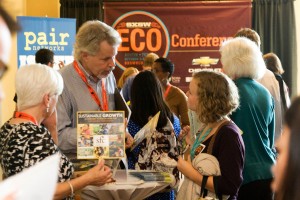As sustainable travel has become an increasingly important topic at SXSW conference, co-host Frank Schaefer invited ATTA to partner in the creation of the first sustainable tourism steering committee for SXSW Eco 2014
 By Liz Ferrin, Director, Strategic Partnerships
By Liz Ferrin, Director, Strategic Partnerships We were welcomed with true hospitality by our hosts from SXSW Eco, the newest division of the internationally renowned SXSW conference, at the Austin AdventureConnect event for ATTA.
We were welcomed with true hospitality by our hosts from SXSW Eco, the newest division of the internationally renowned SXSW conference, at the Austin AdventureConnect event for ATTA.“People need a reason to be sustainable, a call to action and something that pulls at the heartstrings. Preserving natural beauty for travel can be one of those calls to action,” said Schafer.
Over 35 attendees joined us in the convention hall for a jointly hosted AdventureConnect event on October 8th as part of the SXSW Eco program. Attendees participated in an open dialogue session on how the steering committee could best be structured, what skills each attendee could contribute to the committee and decisions about the most important conference topics to cover from a programming standpoint in 2014.
Attendees from both SXSW Eco and local ATTA community attended the Adventure Connect event, as well as brand representatives from Patagonia and Popular Science.
Upstairs in the Austin Convention Center, the panel, Sustainable Travel: Moving to an Industry Standard, preceded the AdventureConnect event with many attendees coming from one straight to the other, including speakers, Malia Everette (Altruvistas), Catherine O’Connor (Outside Magazine) and Jeff Greenwald (Ethical Traveler).
Viewing SXSW Eco from the perspective of sustainable travel, a few macro trends emerged in the panels over the course of the conference:
The evolution of the sustainable mindset:
The same path to consumer’s sustainability mindset in purchasing emerged in multiple panels with remarkable similarity.
For many consumers, the path toward increased sustainable practices in day to day life begins first with what you put “In you” (what you eat), then “On you” (what you wear, personal care products), then “What is around you” (what you buy for your home, cleaning products, what you drive, the vacations you take).
“Manufacturers won't increase cost of production just because it’s the right thing to do. They have to see evidence that the end user will pay extra for sustainable goods. The consumer isn't going to separate plastic in their kitchen just because it's a good thing to do. If it's tied to something that's is viscerally important to them, they will. The entertainment industry can move people because they listen to music or watch movies more than reading scientific studies. The same holds true for travel,” said Frank Schaefer.
Understanding this evolutionary path to create specific marketing initiatives toward sustainable travelers can help better assist destinations and tour operators to achieve more targeted traction with consumers who have already adopted this ethos.
Do I have to be an activist or extremist to effectively contribute or have a more sustainable lifestyle?
The Science of Inspiring Good Behavior panelist, Dave Schiff of Made Inc. put it succinctly: “I don’t have to be a hippie to not want to poison myself.”
Not every environmentalist is a radical and there are as many definitions of sustainability as there are for what constitutes adventure travel.
For actor and environmentalist Adrian Grenier, “There is an aesthetic quality to environmentalism. It’s an expression of our higher selves to live aesthetically and creatively.”
This bodes well for the adventure travel market in general, and particularly for sustainable travel. An artistic and creative lens cast on the reason for preserving irreplaceable destination resources for generations to enjoy is the opposite approach to the guilt and fear-mongering that often leads consumers to sustainability fatigue.
Transparency
In Joey Dumont’s great panel, Can Advertising Save the World?, he made a number of fantastic observations about the importance of transparency when talking to consumers.
He quoted the old Mark Twain adage, “Tell the truth, it’s easier to remember” and coined his own: “Clear is the new Clever in advertising.”
Dumont continued, “Trust in corporate brands is at an all-time low. People trust 90 percent of peer reviews and 20 percent of advertising. Successful companies of the future will improve people’s lives.”
 Pedro Viera, GoodGuide’s VP of Sustainability & Ratings spoke about the “Green Gap” that still exists in what consumers say they want to do and what they actually do, but they are still actively searching to become more informed on the products they are buying.
Pedro Viera, GoodGuide’s VP of Sustainability & Ratings spoke about the “Green Gap” that still exists in what consumers say they want to do and what they actually do, but they are still actively searching to become more informed on the products they are buying.
The public unveiling of the Good Guide initiative took place at SXSW Eco.
Good Guide, a green, healthy and safety product review service has just partnered with Target, second-largest discount retailer in the United States to launch a program that has been in development for more than two years. When a retailer of that size and scale launches such a precedent setting initiative, it’s time to sit up and take notice.
Starting this month Target is requesting that vendors representing 7500 products in household cleaners, personal care and beauty, and baby care products it sells complete an assessment where they will be assigned up to 100 points based on the sustainability of ingredients, ingredient transparency and overall environmental impact.
If you are already strategizing your marketing tactics from a foundation of honesty, you will be happy to hear consumer use of peer-reviewed websites to find out what a destination is really like based on feedback they trust is a trend you can expect to continue. If you aren’t yet it is time to strategize your marketing tactics as consumers can and will learn the truth.
Successful Sustainability vs Successful Business – Is it a choice? Does it have to be?
As the world moves toward a more sustainable ethos, the dilemma companies are now is facing is a very real question: does sustainability lead to profitability?
How does a company find the economic opportunity as business moves from what was formerly a strictly profit strategy to maintaining and even increasing profit while remaining sustainable? As this becomes a more important issue, it will no longer be just about the bottom line, it’s about the bottom line while still being sustainable.
It’s important that companies keep in mind that they need to continue to be successful in order to be able to contribute. As Joey Dumont mentioned in his presentation, “Be a successful company first, a green company second.” Taken out of context it could be misconstrued that it is not important, but as Pedro Viera from Good Guide noted, “If your company doesn’t take action, someone else will.”
Positioning can also be tricky when you are marketing your destination. Dave Schiff of Made Inc. noted in the panel, The Science of Inspiring Good Behavior, “Leading with the cause and by the way, here’s the product is a bad idea. Lead with efficacy.”
Sustainability should be part of the message - but it is a tactic, not the message. The message is getting travelers to visit your destination or tour through promoting the positive attributes of the experience. Sustainability is part of that message, and while it may help a traveler choose your destination or tour over another operator, your ability to market the total experience is still important to keep the energy saving light bulbs on.
What isn’t working
SXSW Eco in it’s third year brought together over 3,000 participants from business, government, academia and NGOs to explore sustainability topics including science, policy, design, economics and more. With such a diverse group of speakers and attendees, there was still one common theme that emerged: scaring people into doing the right thing doesn’t work in the long run.
What doesn’t work for your customers? Becky Chambers of Whole Foods didn’t mince words: “Fearmongering, making customers feel bad, stupid, overwhelmed or helpless.”
“You don’t want to be a ‘green finger-wagger,” echoed Seventh Generation CMO, Joey Bergstein.
Googling “Eco Guilt” returns over 4 million search results. Clearly, the public is well aware, as are companies that this is a strategy with diminishing returns. Alison Monahan of Triple Pundit wrote a great recap of one of the SXSW Eco panels entitled, “Want to Sell Your Sustainable Product? Stop Being So Gloomy!”
“Lead with efficacy, not sanctimoniousness,” said Dave Schiff of Made, Inc.
The message here is unmistakable. Talk about the virtues of what you are doing to create a wonderful experience for travelers that they can feel good about, not bombard them with everything they are not doing. Lead by example and be a positive influence on those who visit your destination to take new practices back into their daily lives when they return home with great memories.
SXSW Eco 2014
As the sustainable travel topic moves from infancy to becoming a greater part of the programming in next year’s SXSW Eco, we received great feedback from attendees to the AdventureConnect/SWSW Eco event. Some potential panel ideas for the 2014 conference included:
- Keeping business dollars in local destination economies
- Travel carbon offsets
- Replacing business travel with video conferencing
- Sustainable company meetings, sales meetings and trade shows
ATTA is excited to help contribute in this exciting leadership role to one of the foremost emergent conferences in the Eco space. A huge thank you to our host and partner Frank Schafer, from SXSW Eco. We look forward to creating great momentum for this initiative in the coming months ahead.
